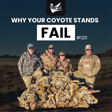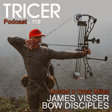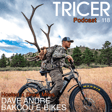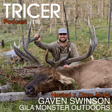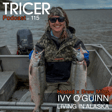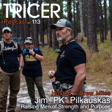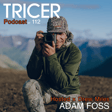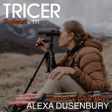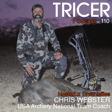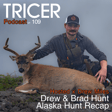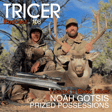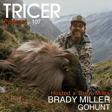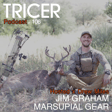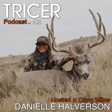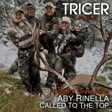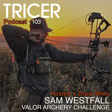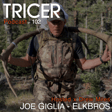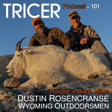Introduction and Prayer
00:00:01
Speaker
You are listening to the Tricer podcast, where we talk all things hunting, gear, and the great outdoors. Before we begin, let's start things out right and put God first. Lord Jesus, I thank you for Tricer, and I ask that you can use this podcast as a way to bring joy to all of our listeners.
00:00:17
Speaker
We lay Tricer and this podcast at your feet. Amen.
African Hunting Trip Overview
00:00:22
Speaker
All right. Going to have a fun one today. i had the opportunity to spend 10 days, I think it was, in Africa.
00:00:31
Speaker
And ah one of the guys who was actually in my like inner circle group, we have like we had like four groups, was this guy, Jared, from... Man, Jared, where are you from?
00:00:42
Speaker
i i'm in iowa iowa i know it's one of those corn states back there you know um big corn state big corn state and uh man jared i just had such a great time hanging out with you and hunting with you and you're just a huge bow hunter and a phenomenal hunter and i was like i gotta get you on the podcast to talk white tails but i guess man before i even get into that how you doing man Good. Busy just like you are.
Life and Career of Jared from Iowa
00:01:11
Speaker
seems like there's never any break anymore. People people will look at my career and think it all revolves around the fall hunting season, but I think it it might even be busier outside of the fall months anymore. But it's all good. It's all a lot of time outside, which yeah I couldn't ask for anything better there.
00:01:28
Speaker
and I really want to get into the whitetail stuff and understanding because you actually manage properties and you like you actually get hired on to come develop properties and you know, hey this what you need to cut
Misconceptions About African Hunts
00:01:37
Speaker
down. So we need to grow, but man, let's talk about Africa a little I haven't really talked about Africa on here too much.
00:01:43
Speaker
I didn't, I didn't want to go to Africa. I had no desire to ever go to Africa. for me, it was like, I don't want to go do a canned hunt. And man, I'll tell you what, I want to go back every year after going to Africa. What were your take on Africa?
00:01:55
Speaker
I couldn't echo that anymore. it's I've never had you know i've seen Africa hunts, heard Africa hunts, but never had the desire to do it myself for the same reason that you just mentioned.
00:02:08
Speaker
yeah from From a hunting standpoint, everything I do revolving around hunting, up I truly enjoy the chase and the challenge and enjoy making it harder on myself every year.
00:02:20
Speaker
And that's just not what I thought of when I thought of African hunts. But, you know, this was kind of a unique opportunity, as you know, it was about more than just the hunt. And so that's kind of what convinced me to to make it work schedule wise.
00:02:35
Speaker
And, you know, after after being there, ah can't wait to get back. the The whole experience, seeing the culture, seeing the life over there was enough to make the trip worth it. But beyond that, the hunt itself was um almost second to none. I compare it.
00:02:55
Speaker
after doing that compared to Western hunting out here, you know, steep physical terrain, um trying to spot stock animals that are super keen, super, I mean, just just next level senses.
00:03:11
Speaker
And I, you know, I still think from talking to a lot of people, I still think 95% of the hunts over there in Africa are like what we thought. I think we got really lucky in this situation.
00:03:22
Speaker
and just got put in ah the type of hunt that we enjoy, that we're looking for. So, uh, super great, grateful for that experience and and to have that challenge of the hunt. And it was certainly challenging, know, obviously, especially with the bow, the, again, these animals are just, their senses are, are awesome. Um, you know, it's, it's in their DNA, I think to escape predators and,
00:03:45
Speaker
You know, we saw that. And and also the the amount of game was was crazy to me, too. Just it's a target rich and but environment on one hand. But when you're going after specific species like, you know, we spend a lot of time chasing kudu.
00:04:00
Speaker
you find one to get on great
Challenges of Hunting Kudu
00:04:03
Speaker
the problem is there's 50 to 100 animals between you and him and you know good luck because they're all they're all all out there to ruin your hunt and and and to blow the other game out so um yeah just just such a cool experience um getting to getting to see that getting to hang out with guys like yourself You know, one person going into that hunt and I think there was 12 of us.
00:04:26
Speaker
Um, but to leave there with, with some really good, uh, you know, new friends, new industry connections, that type of stuff. It was a trip of a lifetime for sure. Yeah, man. So I guess I would compare, because in my mind, it was just Africa was just pit blinds. Like always just heard like, you know, the guys who I know who have done it, was mostly like rich dudes who never really even hunt the United States. They come back and they've got 15 animals hanging up in their house. Right. Like as much as you're willing to spend, it's like going to a buffet. Right. That's I've always thought it was. Like you're going over there and you're just going to, how much that one cost? And you shoot it and you shoot it and you shoot
00:05:01
Speaker
And man, it was nothing like that except for the fact there was a ton of animals, right? So yes, it was Western big game hunting to every, I mean, you're glassing from miles away to find animals sometimes, right? And you're finding animals you're getting out and you're putting I mean, I stalked a zebra. I stalked archery apparently. I missed twice when i was over there. I drew back twice and two animals and missed both of them.
00:05:25
Speaker
But we stalked that zebra for, four or five hours. You know what i mean? Like you had some Kudu stocks that were easily went from seven or 8 a.m. till noon or one multiple times that didn't happen.
00:05:38
Speaker
Right. It just because they're like the Kudu is like the size
Praise for Tuli's Hunting Outfit
00:05:42
Speaker
of it, probably the size of an Elkhemy little bit bigger. But so So much like, but like switched on like a coos deer. And I don't know if it's because they just have like so many more predators over there. Like, you know what i mean? Like, I mean, they just have lions, I guess. And the lions are just such awesome predators that these animals are just so switched on.
00:05:59
Speaker
But it was ah like nothing I've ever experienced before. And it was totally opposite of what I thought it was going to be. Right. Yeah. The coo do, you know, when you mentioned, know, The comparison to elk, I saw so many parallels to elk with regards to how they act. It's a bull of cows, you know, just their their senses and all that type of stuff, except for two big things, which, in my opinion, made it harder. One, you can't call it to them.
00:06:25
Speaker
Right. Like ah a bull elk, you can get in and get cow calm closer whatever. And two, they don't vocalize. So like again, elk, you can, you can locate them based on hearing them, you know, kudu, the only vocalization that they have comparable to the elk is their barking, you know, which is the sound you do not want to hear.
00:06:45
Speaker
Um, so, uh, those two things like to me made chasing kudu with a bow as hard or harder than hunting with a bow.
00:06:56
Speaker
It could be that. And also we were hunting, should mention we were hunting with outfit called Tali's, Tali's called African hunting.
Community Support by Tuli's
00:07:02
Speaker
And they were just, and it's a phenomenal outfit. They only come with true animals too. So I didn't really think that till right now, but we're hunting seven, eight, nine year old kudu.
00:07:11
Speaker
So, you know, they won't shoot the small ones. And so we have some small opportunities and some other animals, but they won't shoot those. So you can animal with eight years of experience under their belt. It's just like trying to kill an eight year old bull here. you know it's a lot harder. They're, they're just smarter. You know what i mean? Like, cause like, I know like, you know, like I had a bull this year, i got close on with my bow and he, he stopped a couple times for me, but granted it was 80, 90, 120 yards. I wasn't gonna take that shot with my bow.
00:07:36
Speaker
But these kudu, man, it was almost like a mature, like a coos deer, mature mule deer, where when you bump them, they just go and they don't turn around stop. They don't look back. They don't give you, you know, once while you an animal kind of stop and like, what was that? They're like, nope.
00:07:51
Speaker
The first sense of of fear or something, they just leave, leave the country. Yeah. Yeah. Yeah, and that's a good point on mature animals. And it's funny, like people don't have an experience that, you know, conversations I've had since being back. Everyone's like, were you with an outfitter or a guide?
00:08:09
Speaker
And that was my first ever hunt with an outfitter. So was my first experience doing
Wildlife Variety in Africa
00:08:13
Speaker
that. But you have to over there. Like it I can't imagine trying to. on my own, figure out the difference between a six year old kudu and an eight year old kudu. There's no chance.
00:08:25
Speaker
Or any of the other species for for that matter. I was calling them Eeland up until the last day. Like it's just, there're there's so many critters, man. That was the cool thing. It was like, oh we're like we were going, i think we were after, it we were after a kudu one day and you ended up putting a stock on a spring buck.
00:08:43
Speaker
and getting a spring buck. Yeah. We were after a kudu. Yeah. Yeah. After kudu, then it switched to impala. We crossed the ditch and the public was gone, but the spring buck were there. So it was like changing three so different species within half an hour.
00:08:58
Speaker
And yeah, it's, yeah, exactly. Yeah. Kudu, impala, spring buck. And then we sat there on these spring buck for, I couldn't believe like those things are so switched on. They're like, um, like antelope, right? They're big prairie animals, rolling groups. Yeah.
00:09:13
Speaker
in the open and man, Jared's just pinned down in the middle of this field behind this bush for gosh, but had to be at least an hour, maybe two hours. And, uh, these things are coming towards me and I'm like looking at him I'm like,
00:09:27
Speaker
Cause I'm hiding behind a bigger bush. I don't want, we tried to keep our distance, you know? And I'm like, man, when are they going to shoot? But I don't realize that Jared's like completely pinned down by some more. And then he ends up shooting the spring buck, like right in front of us who watched him shoot this thing. And it was ah you can hear his arrow go past us, you know what i mean? Where he shoots a spring buck.
00:09:43
Speaker
And it was just a cool experience, man. It was like, even if you blew, yes, it Western with game money. but you blew a stock, you weren't upset. Cause there's just so many more animals to go after.
00:09:54
Speaker
you get those reps in, right? And a lot of animals were killed with bows when we were over there. I mean, within our group, you know, I mean, there was guys that killed the red letchway. There was a freaking, a bunch of warthogs were killed. Wildebeest were killed. You killed a wildebeest.
00:10:10
Speaker
um I mean, it was just, it was a neat experience. Yeah. Yeah. It was cool. I think it, you know, it was just funny to see like the, Just the difference, like, you know, I think we all started out trying to kill as many animals with our bow as we could. And it was it cool, like, you get back to camp, it's like, man, what would everyone kill? And it was a little it was kind of slim for the first few days. And then when when most guys switched over to the guns, was like, you know, it tripled the amount of dead animals that were back at camp and when we got back.
00:10:43
Speaker
Um, so we, even the playing field a little bit, but yeah, it just such a cool experience. Um, not, not even close to what I expected from that standpoint. Just, just, uh, the hunting was awesome. It just, and I can't wait to get back over there.
00:10:59
Speaker
You know, want to take buddies over there, take my wife over there. Just, I think it's one of those things that even if you're a non-hunter, it's cool to experience something like that.
Desire for Future Africa Hunts
00:11:09
Speaker
Yeah, and I think we might have been a little bit spoiled because it's the family we got to be with. It's like a family that's been in this valley for...
00:11:15
Speaker
I think it's like 300 years you're telling us, you know, and they, you know, their wives are involved, their children are there. You're literally coming into their home and they're cooking for you and there's kids running around, there's dogs running around and like, you're in these beautiful, don't want you to call them yurts or huts, what you want to call them. Like, you know, single bedroom studio apartment basically is what I'd call it, I guess.
00:11:35
Speaker
yeah And you know, you're, there's a lake and every morning you wake up and there's Impala Springbuck and right out in front of your house eating, you know, you're not allowed to shoot those ones because they're like the pets, you know, Yeah.
00:11:47
Speaker
And it's just like your wife would go have the time of her life. Like it would just, it's just beautiful. It's so like I was just in Hawaii last week and most of what we did is just sit around and read books and sit on the beach. And I'm like, man, she could have the same thing in Africa. And it had probably a cooler experience seeing some really slick animals, you know?
00:12:05
Speaker
Yeah, I still never got just driving around just the animals you see. Like, you know, here in the Midwest, we drive around, we see deer in a field and out there you drive around, you see a rhino or an elephant. That was cool.
00:12:19
Speaker
Just wild animals just out there roaming around. and And that was, that was cool. Again, one of those things that a non hunter would, would enjoy seeing. Yeah, they have access to so many properties, right? So they have they have their own property and they have access to like a bunch. They've been around for so long and they're so well respected. Like we got to hunt these, don't want to call them rich dudes, whatever. Rich dudes property is this giant bull.
00:12:42
Speaker
And like they fly their own private plane in and land and hunt there and leave. We got access to it. And like at one point up on this hill and we're glassing and you're looking down, you're like, oh, there's some elephants. Yeah.
00:12:54
Speaker
Oh, there's so some rhinos. There's some, there's some giraffes, right? Like it just, I mean, it was just unreal. Right. And then Jared took off went on a, Jared took off one after a kudu. that This is Jared's week. Every day he would just take off after a kudu and then the kudu would win.
00:13:09
Speaker
every day I'd come back empty. It would win. And to me, and my kid was sitting in the truck for hours at the end. We were sitting there and there's all these baboons like all around us. We're watching these baboons like right above us. Right. I mean,
00:13:20
Speaker
Um, I was telling the story, like when I shot, I ended up switching over to a rifle, uh, like the third or fourth day. Cause it was kind of like, it was hard with my son and me trying to kill. It was, I had a great time, but I switched over to rifle. And when I ended up killing my Kudu, ended killing a wildebeest and a Kudu at the same time.
00:13:35
Speaker
i was going after a wildebeest. I saw odd ad. I was going after a wildebeest. There was golden and blue wildebeest got over there, laid down for like three hours And then I'm looking the wildebeest.
00:13:49
Speaker
I'm looking at the odd ad. All of sudden some baboons show up and also an akudu shows up. So in my scope, there's odd ad wildebeest, blue wildebeest and golden wildebeest and baboons in one and, and audits of five species in my rifle, in my rifle scope.
00:14:05
Speaker
And I ended up shooting the kudu and the wildebeest, you know, um, It was just like, where else do you get this experience where you can see this many animals? You what i mean? Like the more you lay there, the more they just showed up and came out. and Right.
00:14:17
Speaker
And it's tough to explain to people that that weren't there and experienced it because when you say that, it's like, oh that sounds like a canned hunt right there. Oh, it it was far from that. It's such big country.
00:14:31
Speaker
And again, I didn't even expect the the mountainous terrain that we were in. Just that alone was was not what I expected from Africa either. I can tell you they were not stoked where I shot my animals, and I did not get my hides back because they couldn't get them out in one piece and on those ones. So I only just did skulls on those animals because it was so steep that it was – if I were to make it slip, you'd roll down this hill.
00:14:53
Speaker
Where I shot him, it was like yeah think it was like a shot uphill Yeah, it was like at the end of the day, or by the time we got on them, it was at the end of the day. And yeah, to your point, like our guy, Peter, he he brought in trackers, but he's like, we got to bring them off. Like it's going be too dangerous having them up there after dark on that steep of ah a mountainside.
00:15:16
Speaker
yeah it was It was wild, man. It was cool. It was ah it was an experience and a half. and I highly recommend Tully's. This could be a Tully's commercial. I don't care. These guys were just awesome. Next level. and this's Not only that, just solid Christian family that's doing It's giving 10% of their proceeds goes back to their community to help children in their community to basically, you know, you watch the news and it's like, oh, South Africa is corrupt. And it's all this, you know, it's it's all over the news right now.
00:15:45
Speaker
And you guys are actually plucking kids out of their community and creating solid leaders out of them through their discipleship program. They put them through um a year-long intense discipleship program for, I think, 10 kids.
00:15:56
Speaker
ten kids And when they get out, they have like 10 job offers. Like everyone in the community wants to hire them because these kids have such a work ethic and are so you know morally sound. Yeah, they're doing some really cool things.
00:16:09
Speaker
I just want to say I don't recommend Tali's because I want to be able to book a future hunt with them.
Passion for Whitetail Deer Hunting
00:16:15
Speaker
No, I'm just kidding. They're such an awesome group. And yeah, I can't imagine going with anyone else on on another trip over there.
00:16:25
Speaker
Yeah, right now I'm kind of like, I'm just going to go back with these guys every time. Right? like i don't I don't think I've just heard, even hearing some of the stories of other outfitters and from guys there that seem kind of like nightmares. These guys just seem so, yeah, you know, just on it, you know? And I keep joking, like, I really want to go shoot. Like, they have this have this thing called, like, the Little Ten, and it's like these little dikers that are like, I mean i don't know how describe, 15-pound deer. And I'm like, that would be a really fun challenge to go over there and try and get the... You know, they don't have all of them there, but they've got, like, five of them, you know?
00:16:55
Speaker
Like would be kind of, that seems kind of fun to me, you know, cause honestly I'm like, what am I going to to all these giant animals? You know, like I got enough. if My wife's already over all the deer and everything in the house, you know? And yeah, that tiny 10, you could do a little miniature shoulder mounts and fit it all inside. I would love to do a midch tiny 10 shoulder mounts with like a little five by five area on my wall, you know?
00:17:16
Speaker
ah You could do all 10 them in that little space about the same same size space as one other shoulder mount. yeah oh dude like some of those e like the elands are over there like 1500 pounds something crazy i mean these giant animals dude and just these bodies and uh yeah some of those animals are giant i didn't shoulder out any of mine did you shoulder about any of your stuff here yeah so it just hides gold mounts yeah yeah me too but um yeah dude so africa was cool but uh
00:17:48
Speaker
you had to come we had come back to reality just to our, to the lonely whitetail. Yeah. It's, it's, it's funny coming back to, to that, but ah yeah, my, my bread and butter is, is whitetail, obviously being in Iowa growing up, um, hunting these things, but it's, you know, I think we all kind of evolved,
00:18:12
Speaker
in our journeys and and hunting journeys. And to me anymore, know, I still love killing big, mature whitetails. Don't get me wrong. But the the entire process is kind of where I've, where I've found myself, the, the off season, um, the chase, you know, when I, when I killed a target buck that I'm, that I'm going after, there's almost this like feeling of like,
00:18:36
Speaker
you know, being bummed out that's over that, that chase, um, and, and the journey of, of following deer over the years or, or trying to get on and for years, um, that's the part that I love the most anymore. And so, know, I've, I've really gotten more deeply involved in the land management side, taking properties that are somewhat raw or just average mediocre hunting and doing the things that I enjoy to try to make them into premium whitetail farms, um, you know, bettering the habitat, bettering the food, um, that type of stuff. So, uh, that's, that's what I'm busy doing this time of year when I'm, I'm not actually hunting.
Whitetail Deer Land Management
00:19:21
Speaker
I'm spending a lot of time on properties, figuring out how to make them better. And not just for myself, but for for other guys too other landowners that you know may or may not have the the experience or the time to put in to their properties.
00:19:37
Speaker
So yeah, spent a lot of time doing that and that's what I've been catching up on since getting back from Africa. Yeah, it is. ah I don't know why like us Western guys like kind of look down on Whitetail, right? And then when you think about it,
00:19:53
Speaker
And your guys' experience is so much more intimate with these deer, right? Like, like you said, like, like, I don't know the deer. my Like my kid shot a giant last year. And like, I didn't know, I didn't know that deer when he was three or four or five. And did you guys know these deer for a lifetime sometimes, right? I mean, you're watching them come up.
00:20:09
Speaker
You're, don't want to say you're raising, you're not raising them, but you're, you're creating a habitat for them to live in. Um, given an opportunity to breed and allowing them like, I feel like you guys are so much more picky than us too. Right. Like a lot of times we're just shooting animals out here.
00:20:22
Speaker
You guys are nope. Give them one more year, give them one more year. Yeah. And putting way more effort into it than we are way more to get these good deer. Yeah. And I think that, I don't think one is better than the other. I just think that it's there's just different situations. You know we have that ability here and you got to think too, you know, some people may hear that and think, man, that you're, you're hunting.
00:20:46
Speaker
you know raised deer farm raised deer and it's not obviously not even not not the case but you also have to remember too the the size of land here i mean i hung a lot a lot of like 40 acre 80 acre 100 acre pieces well the deer travels a lot more than that so just just because we know a deer doesn't mean he's always around You know, most of the time I don't see the bucks very much this time of year on my properties.
00:21:16
Speaker
um You know, typically they show up closer to fall, but even then they, you know, they're, they can roam for miles if they want to, as they're chasing does and stuff. So it's not quite that, but yeah, just, I would say
Naming and Tracking Whitetail Deer
00:21:30
Speaker
you're right. You're spot on when it's, when you say like you, we, you know,
00:21:36
Speaker
know the animals were hunting sometimes not all the time sometimes you'll kill a random deer that's just out cruising you know um but yeah it's it's the it's just part of the overall experience that there's not again not one better than the other just different experiences and i and enjoy going out west and hunting you know the other way the way that's more common just as much as anybody else so are you naming these deer
00:22:06
Speaker
sometimes i will sometimes lately i haven't but it's the only thing with regards to naming them you know obviously i've filmed my hunts and and share the stories of my hunts and have for forever 15 16 17 years something like that um and it does make it easier for someone to follow along If there's some type of like, you know, but you you characterize the bucks on that with us through a name and you you can only talk about so many big tens or, you know, the sticker buck or, you know, these common names that you hear thrown out there. Well,
00:22:46
Speaker
The problem is there's lots of those. So if you come up with some type of unique identifier, it does make it easier for a viewer to follow the story, which again is my favorite part.
00:22:57
Speaker
You know, well told story is the one thing that I don't think will ever get old. And so that's what I try to do is is tell the whole story. you know Of course, from entertainment perspective, but also educational. I think guys can can watch a well-told story and pick pieces of it to go and apply to their own situation.
Challenges in Managing Whitetail Populations
00:23:20
Speaker
So throw some whitetail names out there. What are some whitetail names you got that you've read through the years?
00:23:26
Speaker
Like said, I haven't named any in a long time, but one of the more famous ones, this was probably, to think, 2014. So like 11 years had...
00:23:37
Speaker
I had a deer that I called George Brett. um he I was a big baseball guy, and if you're a baseball guy you you know the name George Brett.
00:23:48
Speaker
Um, but one of the more famous incidents with George Brett, the real baseball player, George Brett was, you know, a pine tar incident where he, he was got caught or got accused of using too much pine tar on his bat.
00:24:04
Speaker
And, uh, this book, when he first showed up, it looked like he had pine tar up and down his antlers from rubbing your pine trees or whatever.
00:24:14
Speaker
Um, so that's where that name came from. And, He kind of became a somewhat of a legend of a book just from the different encounters and and cool footage that I filmed him fighting in a Creek one year with another buck, just ah an epic white tail fight.
00:24:30
Speaker
Um, and so he became pretty well known. Um, but again, like I think part of it was because he had a name, you know, it, it made it easier for viewers to follow along.
00:24:42
Speaker
Um, it's actually that deer right there and the right there. That is a gigantic deer. Yeah. So yeah, that's, that's, that's probably one of the more like well-known names that I can think of over the years. Like said, I don't remember the last time I actually named, named one per se that, that really stuck. You know, sometimes if I'm just talking to buddies or whatever, I'll be, you know, throw out a name like,
00:25:15
Speaker
know, the double G2 buck, just to, just have some type of reference on the deer on which specific buck you're talking about. So I never really thought about this until now. Cause like we're, I'm probably go have a whitetail lease this year. I haven't told you that yet. um my I hired a whitetail guy. He's running my company now. Right.
00:25:32
Speaker
So going to get a white, a Pennsylvania whitetail lease. Oh yeah. but You know, you guys, like you, you, George Brett, like you build this property for George Brett, right? and you got, you got the corn, you've got the, you know, you're clearing things and I'm just, don't know, I'm totally butchering what you do making it sound so much easier than what you do if it's so much more than that.
00:25:50
Speaker
And now George Brett can get shot on the neighbor's property. Oh yeah. Oh, that's, that happens every year. I mean that's the reality of it. Again, it goes back to, yeah We're hunting smaller, relatively smaller parcels compared to the vast land out west. and These deer don't know
Balancing Income and Habitat Creation
00:26:10
Speaker
where the property lines are, so they're they're just just going to go. They're wild animals. they get they They'll get killed by neighbors every year. It's just part of it. You just you just know it's part of the game and it's a chance. and You're not necessarily trying to build habitat for one specific deer. You're trying to build for the whole herd and give them
00:26:29
Speaker
less of a reason to leave, make it so they are healthier to get through some of our tough winters to where, you know, when that, you towards the end of the winter, instead of trying to put all their resources towards their health, you know, they can, you know, live and thrive a lot better just because they have everything they need and just, you know, natural browse and water and all that type stuff. So,
00:26:58
Speaker
Yeah, it's it's just, ah it's hard to explain until you're in it. Like it it sounds like we're doing 100% for the deer, but honestly, I've come to love the work of it, the process of it. So I'm kind of doing it for myself because I enjoy that. I love seeing, you know, new habitat take shape yeah rather than, know, we have a lot of we're We're in big ag country, so a lot of row crop ground around, but taking a historically row crop field and turning it into native grasses and habitat.
00:27:34
Speaker
oh I love seeing that type stuff. It's not just the deer that benefit. there's There's a lot of wildlife that benefit from that. so I've fallen in love with the process for sure. it does it benefit the deer? Yes. Does it benefit the hunting? Yes.
00:27:47
Speaker
But it benefits my wellbeing, I guess you could say, just cause I love the work of it. So walk me through that because in my mind,
00:27:58
Speaker
like what does it look like for you to get a property and change it? Cause in my mind, you say you're taking a row crop and turning it into grass. Like in my mind, like I would just want to have like cornfields everywhere and that the deer can meet the cornfield. So you're not just having cornfields. Like why do you want to change a cornfield into a, like talk, you but you're getting to property. What does that look like? ah i want to, I don't know, Wes, understand what the process is and how much work you really put into it Cause it's, it's shocking to me how much work you guys put into these deer.
00:28:25
Speaker
Yeah. And every property is a little bit different. Like, You you talk about the row crop. Row crops, obviously income. That's a good thing. But we have we also have CRP programs, which is crop reserve program. So basically you take it out of crop production and the government will pay you so much per acre per year.
Importance of Diverse Food Plots
00:28:44
Speaker
to have it in established in a native grass program. So you still get so like, let's for a non farmer, a farmer can obviously make more because they're the ones who work both say non farming landowner has ground and there's some tillable acres, right?
00:29:02
Speaker
You can cash rent that to a local farmer to farm that ground. And that farmer will cut you a check every year for letting them farm you your tillable acres. Or you can enroll it in a CRP program where you go in, you seed like a native grass, depending on the the specific program and the recommendations.
00:29:21
Speaker
You seed a blend of of native grasses and and wildflowers or again, whatever it is. a CRP blend and it's usually 10 or 15 year contract where the government pays you X amount and of acres depending on the soil, you know, let's say 200, $200 an acre on average per year to have that, that ground in CRP.
00:29:47
Speaker
So you still get income from those acres, but now they're more or less habitat. or potentially food rather than just straight row crop.
00:30:00
Speaker
In comparison, I think you were kind of alluding to like the food plot game. Yeah. you You want to have food on your property too. But, ah you know, for the food, you've got to have a balance between food and habitat.
00:30:12
Speaker
You can't just have one or the other. other one Otherwise, the deer going to have to go seek that out somewhere. If you don't have the habitat, they may come to your spot for food, your property for food, but they got to go live somewhere else or vice versa. If you don't have the food, they're going to travel and find it.
00:30:26
Speaker
So you want to find a balance
Replanting Annual Food Plots
00:30:28
Speaker
there. But when I say like these tillable cornfields and beanfields, these are like you know, huge hundreds of acres, sometimes fields that get harvested or, or combined every fall.
00:30:40
Speaker
So ideally you plant food that does not get harvested. You're planting in smaller plots, maybe two or three acres of corn or beans or brassicas or clover, whatever it is um that's available to the deer throughout the the fall and winter.
00:30:59
Speaker
So you're just planting a cornfield or bean field and never harvesting it. Yeah, I mean, a lot of times it's in like two or three acre fields. um The goal is to provide enough food for the deer where it really all year round. But when when we're talking about like the corn and bean plots, you're wanting to provide enough food for the deer to get them through the winter to spring green up.
00:31:22
Speaker
once spring green up occurs, you get that springtime, summertime. There's this time you year, there's forage everywhere. They don't, they don't need a food plot to go feed. They can feed literally everywhere. that Everything's green. Everything's lush.
00:31:36
Speaker
But on the, on the, opposite side of that in January or February, food's pretty scarce. So you want to make sure those deer have some food to help them again, stay healthier through the winter and get them to spring cleanup.
00:31:53
Speaker
That's, that's the goal. So when I look at a property, I'm trying to decide how many acres in food going to base that on, know, what's the deer density like? Is a high population, low population? How much food am I going to need to get them through to spring green up the following season, following year?
00:32:11
Speaker
So like, let's say you let, because this is where like all the work comes into now. Let's say you let this field grow up and die off, right? It has the corn. Do you have to now go back in this year till all that up, replant that field again, or it just keep planting itself?
00:32:25
Speaker
Nope. You have to redo it. So it depends on what you're planting. Corn and beans are obviously an annual. So you got to plant that every year. um Things like clover and chicory, those are perennials. um So those do come back every year.
00:32:38
Speaker
But I try to offer like a diverse mix of your grains, like your corn or beans or sorghum, along with your grains. So your clover, your chicory, your brassicas, that type of stuff.
Water Source Management for Deer
00:32:52
Speaker
Because different times of the year, deer have different preferences. And and I've even seen, it's kind of crazy, but you know, a deer is not a deer when it comes to it's it's probably you know some deer just seem to have like people just prefer different things so um the more diverse you can make your property the the better it's going to be at at holding deer during longer periods of the year geez a lot of work so you guys run feeders up there too or no Not really. Every state is different in terms of the legality of it. Iowa, you cannot bait.
00:33:30
Speaker
You can feed outside of the season if you want to supplement deer. But, you know, maybe late winter after the season closes, I'll put out some feed or some alfalfa, like hay bales, to help, again, get them through the tougher time of the year.
00:33:51
Speaker
but I was not a bait state, so you can't have feeders out or anything like that. Gotcha. Gotcha. And so you'll just throw out the hay, like when it starts snowing, so they have hay, something something to feed on, something to deal with.
00:34:05
Speaker
Yeah. That's a lot of work. No, good. Yeah. Just keep them around and try to keep them healthy and just provide a little bit of supplemental food to to get them through the tougher winter. Now, what about water?
00:34:16
Speaker
Like, are you just doing natural streams or do you guys actually put in like drinkers and stuff for these deer? Yeah. A lot of guys will put in little water holes and stuff like that to supplement. Again, that's kind of one of those things, in my opinion, it depends on the property. Does your property already have ponds on it? Does it have a creek running through it?
00:34:34
Speaker
But waters water can be just as powerful as food. it's I think deer are pretty good at finding finding water where they need to, but you can from a strategic standpoint, you can put in your own little water hole.
Passion for Land Management
00:34:51
Speaker
uh, somewhere that's, you know, more convenient for them and more convenient for you too. Now, do you, man it seems like so much work for this thing.
00:35:01
Speaker
So now you're doing that now. so that's ah that's That's the perfect example right there though. Like it's a ton of work. People have no clue. Like there are days within the last week I come home absolutely exhausted. Like just,
00:35:17
Speaker
My whole body feels like spaghetti, like just, just to the max exhausted heat, you know, all that type stuff. And it's like, you you step back and it's like, man, all this for a deer, like you don't have to do this to kill a deer.
00:35:31
Speaker
And that's a hundred percent correct. But again, I've fallen in love with the process to put in that sweat equity and put in that time and watch the wildlife respond to it, watch stuff grow, watch watch things benefit from it.
00:35:46
Speaker
That is is why i do it. It's not because I want to maximize my opportunity to kill a buck. like ah the The work to reward ratio isn't there for that. ah you have to You have to love the the work and the process of it, first of all.
00:36:00
Speaker
You probably make a lot more money getting a day job and then just go killing a whitetail if you want to kill a giant every year in Texas, but it's not what you're doing it for.
Mobile Hunting Techniques
00:36:07
Speaker
Yeah, exactly. sure You can go shoot a 300-year-old or 15 grand. Yeah. It's just you got use fun to grow it and do that thing.
00:36:14
Speaker
Yeah. So now, are you like are you a tree stand guy? Because you're you're archery pretty much only, right? I mean, are you a tree stand, tree saddle guy? do hunt? Mostly tree stand, yeah. That's what I've loved doing for a long time. you know The tree stand, I do love being mobile. You talked about the saddle game. I haven't quite...
00:36:38
Speaker
I don't quite have the experience with saddles. You know, I've done it a handful of times, but I've been pretty comfortable just with hanging hunts in the tree stand. I like using a really lightweight setup. And I would say north of 80% of my hunts are hanging hunts. So where I'm actually going in, hanging the stand that day, hunting it, taking it down at the end of the Oh, really? You're not going in? In my mind, like you're building this property out and you just got like, you just cut out like a pie shape where the deer come in and you just set your trees down and that's where you're going to hunt em from.
00:37:11
Speaker
Yeah, no, it's not like that at all. I mean, these are, these, these deer are still tough to hunt and you can do certain things to manipulate the movement somewhat, but they're still wild. They're still again, going to cross property lines. They're still,
00:37:26
Speaker
They're still going to use the wind and thermals to their advantage, all that type of stuff. So especially again, when you're hunting mature animals, you're hunting five, six plus year old whitetails. So, you know, you can do a lot and still get beat by them.
00:37:42
Speaker
But part of the reason I like doing the hanging hunts is I think you learn a lot more. just about deer behavior and how they use properties, but also you always have that element of surprise. So like, let's say you have a preset stand or blind or whatever it is, and you have, you create a negative experience or two for the deer, you blow them out, you, you spook them from that location. Well, maturing animal, it doesn't take too much of that for them to start to be weary of that spot.
00:38:12
Speaker
Um, you know, they may not completely relocate, but they're going to change on how they do it. If you're doing hanging hunts, you're bouncing around, even if it's only a move of 30 yards, 50 yards, ah you always have that element of surprise on your side.
00:38:28
Speaker
and And that's the biggest reason I've seen a lot of success
Managing Human Scent
00:38:31
Speaker
with that. Those those first time in first time hunting a tree oftentimes is the best. Really? like So here's another thing. So I just went hunting bears.
00:38:44
Speaker
with ah Cody rich and Brad hunt last week and everybody, Travis. And within like the first mile, i could smell Cody. He smelled really bad. We're sweating. I mean we, by the time we got done with this hunt, we stunk.
00:38:56
Speaker
Yeah. Now white tail guys, are you changing at the tree? Let's talk about that process. Cause this is like, I don't understand it. Like you guys are next. Are you like washing your clothes and sage? Like what's the world that stuff?
00:39:09
Speaker
Ozenators. Um, yeah, Sometimes you'll use ozone on on my clothes, not a ton. You know, I try to be as scent free as possible with washing clothes regularly. You know, always try to try to change when I get to a property outside of the truck.
00:39:30
Speaker
It's so, you can't beat a whitetail's nose though. That's the hard part. So you always have to play the wind when you're hunting. But again, I do try to do everything I can because I'm a believer that if you can even you can't beat them but if you can lower the concentration of scent i think you can get away with a little bit more you know even if that deer gives you an extra 10 seconds before he blows out of there that could have been the 10 seconds you needed to get an arrow off or if you can confuse them making them think that you were there four hours ago because it's a little concentration of scent because you're mostly scent free
00:40:09
Speaker
you know, that that's enough to fool them into not knowing you're there at that exact second. So I do try to do everything I can from a a scent perspective with regards to washing clothes and spraying down and all that.
00:40:21
Speaker
But I'm also as smart enough to know you can't completely beat their nose there. You have to play the wind and especially the thermals. That's another thing that, I think it's overlooked in, you know, quote unquote, flatlander. kind Yeah. I've never heard someone say thermals. I wanted to hear about that. because said Thermals. And I'm like, what do you mean thermals? You guys are hunting cornfields.
00:40:40
Speaker
I know. Yeah. It's, it's the same type of thing that you guys have out West where they're going to, you know, thermals are going to fall in the evenings and rise in the mornings.
00:40:50
Speaker
The difference is yours are going up mountainsides, a lot more severe, but you think about, Think about if I'm just on on a slight hill and and behind me there's a ditch and your thermals are still there.
00:41:04
Speaker
they They may not be rushing downhill like a wind like it does in the mountains, but they're still there and the whitetails certainly use that. they They find these spots where they have the thermals at their advantage and sometimes it's for danger, but a lot of times it's for just being able smell what's going on in their herd, being able to scent check the other deer and the does and stuff like that. so I try to play thermals as much as I can.
00:41:31
Speaker
Finding funding setups where my thermals are going to drop down into a spot where the deer can't get below me in a creek or in the mornings, you know, I'll go in deeper knowing my thermals are going to rise up.
00:41:44
Speaker
Um, it's going be harder for the deer to, to detect me because the sense rising up above them. So, um, yeah, it's, it's a thing that doesn't get talked about a ton and gets overlooked as far as Midwest hunting goes, but it's, it's certainly a huge factor.
Cultural Aspects of Whitetail Hunting
00:42:01
Speaker
Yeah, it's not really, dude. ah well Like hanging out with you for a week and just hearing how much time you put into it. I was like, man, this is this is crazy. And I have bunch, I mean, obviously like why is my new guy, Sean, who's running the company for me now.
00:42:14
Speaker
He's a huge whitetail guy, right? I'm going to go shoot my first whitetail this year. going to go back with ah Timber Ninja and Shed Crazy. We're going to go hunt. Yeah. North Carolina. We're to go hunt lever actions in December.
00:42:26
Speaker
we're going to go back there. and I never killed a whitetail before. So we're going go, we're doing public land back there. We're going traditional deer camp, you know, set something up and yeah go back and do that and go chase them. But, uh, I mean, there's obviously an addiction there, right? It's obviously so much bigger, right? Like that's kind of where I'm going with my new shooting tripods. Everything is like,
00:42:44
Speaker
white tails are so much bigger than Western big game hunting. Like, it's just like on a whole, like from Colorado East, there's so many more hunters that are chasing these year, every year that are getting to chase our deer out here. Right. Like ours are so much more scarce, so much harder to get a tag for. And white tails are just like, i don't want to say that like cockroaches, but dude, like you can't kill them.
00:43:05
Speaker
Like we were hunting, I was hunting bears at 8,000 feet in Montana and there were white tails. Yeah. up there I mean, like they just like they they're everywhere. Whitetails are just everywhere, man. They just seems like i don't want to say mule deer on a weak animal, but just like compared to a whitetail, like whitetails just survive and they know they're all over the country.
00:43:29
Speaker
They are. And part of that, you know, the number of hunters is just what we have access to, right? I don't have access to elk here in Iowa, otherwise I'd probably be a ah lot bigger elk hunter. Um, but yeah, it's, it's just a different, different game. It's a different style of hunting and,
00:43:46
Speaker
I love both of them. Anytime I get a chance to draw Western tag, cherish it and love it. I'm looking forward to Montana this fall.
00:43:58
Speaker
but The whitetail is is kind of my ah year-round passion. yeah That's one thing I didn't really realize until then. is like you guys You guys are doing it all year. How many does? When you look at a property, are you going in there and shooting does every year as well or no?
00:44:12
Speaker
Yeah, it depends on the property. But yeah, shooting does is a really important piece to the management game. yeah know you You want to take a certain amount does off the property. Again, it depends on on the density and and all that type of stuff. But one of the challenges we have here is quotas on doe tags or antlerless tags.
00:44:38
Speaker
um I have some properties that I hunt or manage that need a lot of does taken off. You know, again, it's it's kind of that we've gone to the extent of building some of the best habitat around.
00:44:51
Speaker
And so for that standpoint, we hold a lot of deer, but when they create these quotas, they look at the deer populations on a countywide basis. And so that county, a lot of times doesn't have allocated doe tags by the time the season starts.
00:45:08
Speaker
Um, so I, I could tell myself, hey I need to kill 10 does off this property this year, but there's no tags available. And so from that standpoint, I get, you know, I run into just the challenge of, of trying to kill enough does simply because I can't get tags for them on, in certain counties.
Story of Ground Hunting a Whitetail Deer
00:45:27
Speaker
Really? How many properties are you managing?
00:45:33
Speaker
Um, it's good question. It's, there's, there's ah handful, i would say probably six or seven that I hunt and manage. And then there's another, probably that many that i don't hunt that I'm just doing the work for the other landowners.
00:45:53
Speaker
So there's calling you up and saying, Jared, I want to pay you to manage my property. Yeah. Or sometimes just friends and just, you're just helping them out. Like they want to know, hey can you, what should I plant here? How should i set this spot up? Like, where should I put a stand?
00:46:09
Speaker
Um, that type of stuff too.
00:46:12
Speaker
Gnarly dude. So, uh, we always like to have a hunting story on here. You want to tell us story George Brad or you want to tell us, you want to tell us a different story? You want give us whitetail story? Hmm, man. um yeah, I'll, I'll give one. I'll try to mix it up a little bit since we kind talked about the George Brad one.
00:46:33
Speaker
I'll tell the story of this buck in the middle here, ah that one on the pedestal. It was a deer I chased for two years, ended up killing him when he was a six year old.
00:46:47
Speaker
And he was, the other kind of cool thing you get to know about deer is just like their tendencies and personalities. And he was pretty like kind of a loner deer. He lived out, we talked about the CRP earlier.
00:46:59
Speaker
Big CRP, wide open native, you know, tall native grasses and he lived out in that stuff. So from the standpoint of bow hunting, it was really, really challenging. You couldn't get close enough because they there weren't trees or anything like that.
00:47:13
Speaker
was the it's hard to hunt from the ground, you know, with a cameraman. It's not like spot and stock territory. Um, so I had multiple encounters with them over a couple of years and the season was coming to a close the second year.
00:47:29
Speaker
And I hadn't seen him for an entire over, what was it? two months I think it was. I had an encounter November 1st that year and never saw him again until January 1st.
00:47:46
Speaker
Saw him on January 1st he came out following a bunch of does kind of going around this this food source. I don't know where they end up going but my my idea of that night was to get up in a blind and elevated position with my cameraman And if we spotted him, I was going to climb down, throw on a ghillie suit and see if I could go get him while my cameraman filmed from ah in an but elevated blind position.
00:48:12
Speaker
And I did that and I got out there and the. Couldn't really get around. He ended up moving, following the herd, you know, out of bow range. And I watched him walk right by my cameraman that night.
00:48:24
Speaker
Walked within 20 yards of my cameraman. So thought I would just stay put. And at that point, there's like ah less than a week, around a week left in the season. And I'm thinking, you know, it's just not meant to be. This deer has my number. He just literally walked past the position I was in less than an hour ago.
00:48:43
Speaker
Um, but that night I watched him walk by a brush pile. I was kind of looking back at the footage, notice he walked by a brush pile. When we got a good wind two days later, I went in, care, man, I both put on ghillie suits.
00:48:56
Speaker
We climbed up on this brush pile and set up on the brush pile. And fortunately he did it again. He came out, um, has worked his way 25 yards past. And just the, the experience of hunting ah ah giant white tail from the ground like that, being in his turf, um, and doing it like that, where you just felt like you were part of nature. Like, you know, we were in this brush row with pheasants flying up out of our laps, you know, birds landing. It was just, it was like you blend completely blended in with the situation and he had no clue we were there.
Filming Hunts for Education
00:49:36
Speaker
Um, the only time he even like kind of, um, got a little bit nervous was he was walking in walking right at us and again a pheasant flew up out of our brush pile that we were in and that he you know they're they're so aware that time of year the gun seasons that just got past they're being chased around and so like he looked for a few seconds relaxed and then came the rest way in and Cause if you've hunted from the ground and sat for a long time, you know how it's tough. Like you, you stiffen up and you don't quite, you're quite not quite as prepared. And so that I remember, um, knowing that I had one shooting lane.
00:50:19
Speaker
And when I did a practice draw, just cause the way I was sitting in this brush pile, I didn't really have all my core strength and everything. And so I did a practice draw early on the hunt and like struggled to get my bow back just because of the position I was in.
00:50:33
Speaker
And so I knew in my head, I'm watching this, you know, 180 inch deer walk at me. I'm like, when he gets to the spot, he's going to see me draw back. There's no doubt I'm on the ground, 25 yards.
00:50:46
Speaker
And I'm just going to, and I can't hesitate. Otherwise I won't, I won't get drawn just based again, like I'm leaning back like this. And, um, so I just ripped it back and he pins me, you know, looks right at me for the shot. And, you know, I shoot him and he runs a hundred yards and falls over, but,
00:51:05
Speaker
that experience of chasing a deer for two plus years and to get kill him like that on the ground with a ghillie suit on sitting hiding in a brush pile um it was it was epic it was such a cool as as snow ice layers of ice on the ground like you'd hear the deer crunching through the ice on it with every step just such a such cool experience of the footage turned out awesome is You know, one of those. Steam coming off his breath. Yeah, just, yeah, cold, just, you know, all the CRP and stuff had, looked like icicles out there. Everything was just ice coated and just one of those you won't ever be able to replicate, but also one that you'll never forget.
Conclusion and Call to Action
00:51:50
Speaker
That's awesome, dude. And you do film all your hunts. We didn't even touch on that. You're you're a big filmer, big YouTube following. um Jerry, where can we find you on Instagram and YouTube?
00:52:01
Speaker
Yeah, YouTube is the primary platform. It's just my name, Jared Mills on YouTube is the channel. That's again, I like telling the full stories and that's a better platform for the long form video and telling the stories. I do have Instagram again, just my it's Jared J Mills on Instagram.
00:52:20
Speaker
Post some of the short form stuff there. So either one of those. Yeah, guys are welcome to reach out anytime. Yeah, get on there. Check him out. Bug him for some whitetail questions. He's a whitetail dork. He loves these things.
00:52:34
Speaker
That's right. And I mean, there he's top top of the game when it comes to raising up. I wouldn't say raising whitetails, but creating the habitat for him. And and he understands these animals probably just as good as anybody out there right now. And he's highly respected for that in the industry.
00:52:48
Speaker
and just a wealth of knowledge. I know that if I do get a whitetail lease, I might be having Jared come out and hunt with me out there and tell me how my property is. Cause apparently this one's to pretty good, Jared. I don't know. I'll you know.
00:53:00
Speaker
yeah be happy to come out Yeah. I'm actually going to be heading to PA within a week or two. So yeah, let me know. Always, always fun to see, see new ground for sure. Awesome.
00:53:11
Speaker
Thanks Jared. Let's do it again. Yeah. Thanks man. Thank you for listening to the Tricer podcast. Do us a favor and like and subscribe on whatever platform you're listening on. Give us a follow on Instagram and Facebook at TricerUSA and go and check out all of our innovative gear at www.tricerusa.com.
00:53:30
Speaker
Until next time, shoot straight, have fun, and always put God first.

